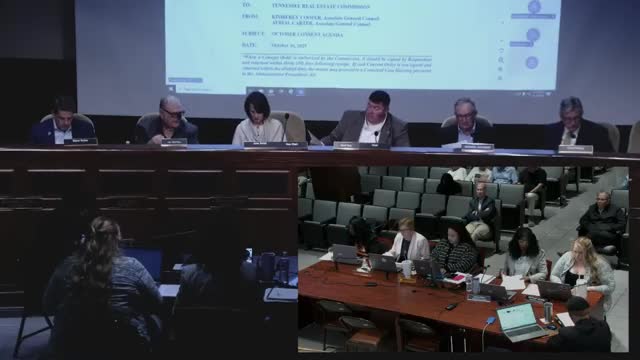Real estate commission orders audit, suspends broker, increases fines and dismisses multiple complaints in monthly legal report
Get AI-powered insights, summaries, and transcripts
Subscribe
Summary
During its Jackson meeting the Tennessee Real Estate Commission voted on a range of enforcement actions from dismissals to a license suspension, an escrow audit, and modified civil penalties; commissioners also directed staff to open administrative complaints in several cases.
The Tennessee Real Estate Commission considered its monthly legal report and voted on multiple enforcement matters, including a suspension of a principal broker’s license, an escrow-account audit, adjustments to civil penalties, and several dismissals.
The commission accepted counsel’s recommended dispositions for most of the matters on its supplemental and regular legal reports, with commissioners pulling specific cases for discussion before voting. Outcomes included unanimous dismissals in several matters, a suspension of a principal broker’s license until Feb. 4, 2026, an escrow audit scheduled for the first week of November, an increase in an affiliate broker’s advertising penalty and required coursework, and an upward adjustment of civil penalties in an unlicensed-activity case.
Key votes and actions were recorded during the legal-report portion of the meeting. Commissioners instructed staff to administratively open a failure-to-supervise complaint against a principal broker in one matter (case 21) and to require an affiliate who violated advertising rules to complete the TRACE advertising course within six months and pay an increased civil penalty. In a separate matter (case 14/15), commissioners voted to suspend the principal broker’s license in the matter until Feb. 4, 2026, and to audit the firm’s escrow account. Several other complaints were dismissed after commissioners reviewed the facts and counsel’s recommendations.
Votes at a glance
- Cases 1–123 (consent block except pulled matters): commission accepted counsel’s recommendations for the remaining cases on the consent list (motion carried unanimously).
- Case 2: Dismissed (motion carried unanimously; mover: Commissioner Gaughn; seconder: Commissioner Smith).
- Case 12: Dismissed as to the named respondent and administratively opened against the correct principal broker; recorded vote: 5 yes, 1 no (Commissioner Gaughn voted no).
- Case 14 & 15: Principal broker’s license (case 15) suspended until Feb. 4, 2026 (motion carried unanimously; mover: Commissioner Smith; seconder: Commissioner Moffat). Commission also authorized an escrow audit of the firm (case 14) to be scheduled for the first week of November (motion carried unanimously).
- Case 21: Commission administratively opened a failure-to-supervise complaint against the principal broker and increased the affiliate broker’s advertising penalty from $750 to $1,000; the affiliate was ordered to complete the TRACE course within six months. Motions carried unanimously (mover on penalty and course: Commissioner Smith; seconder: Commissioner Moffat).
- Case 53: Advertising-on-website matter; respondent retired license and removed the ads after complaint. Commission amended counsel’s recommendation and reduced the civil penalty to $250; motion carried unanimously.
- Case (unlicensed advertising): Commission increased the civil penalty from the recommended $1,000 to $2,000 (motion carried unanimously); counsel advised penalties may be applied per incident or per parcel in unlicensed-activity cases.
- Cases 89 and 90 (related land-disclosure complaints): After discussion and a brief procedural sequence of closing and reconsideration, commissioners dismissed both cases (motions carried unanimously).
What commissioners said and asked
Commissioners pressed staff and counsel for factual details — for example, whether property defects were documented, whether advertisements remained online after notice, and whether licensees had attempted to correct problems within any available cure period. Counsel and staff explained when a matter should be dismissed, when a letter of warning was appropriate, and the mechanics for moving a case to hearing if a respondent does not sign a consent order.
Why it matters: the votes affect licensees’ disciplinary histories, possible civil penalties, and, in one case, whether consumer funds may be at risk (the escrow-audit order). The audit and the suspension are the most consequential enforcement actions for potential consumer protection and enforcement follow-up.
The commission concluded the legal report and moved to new business.
